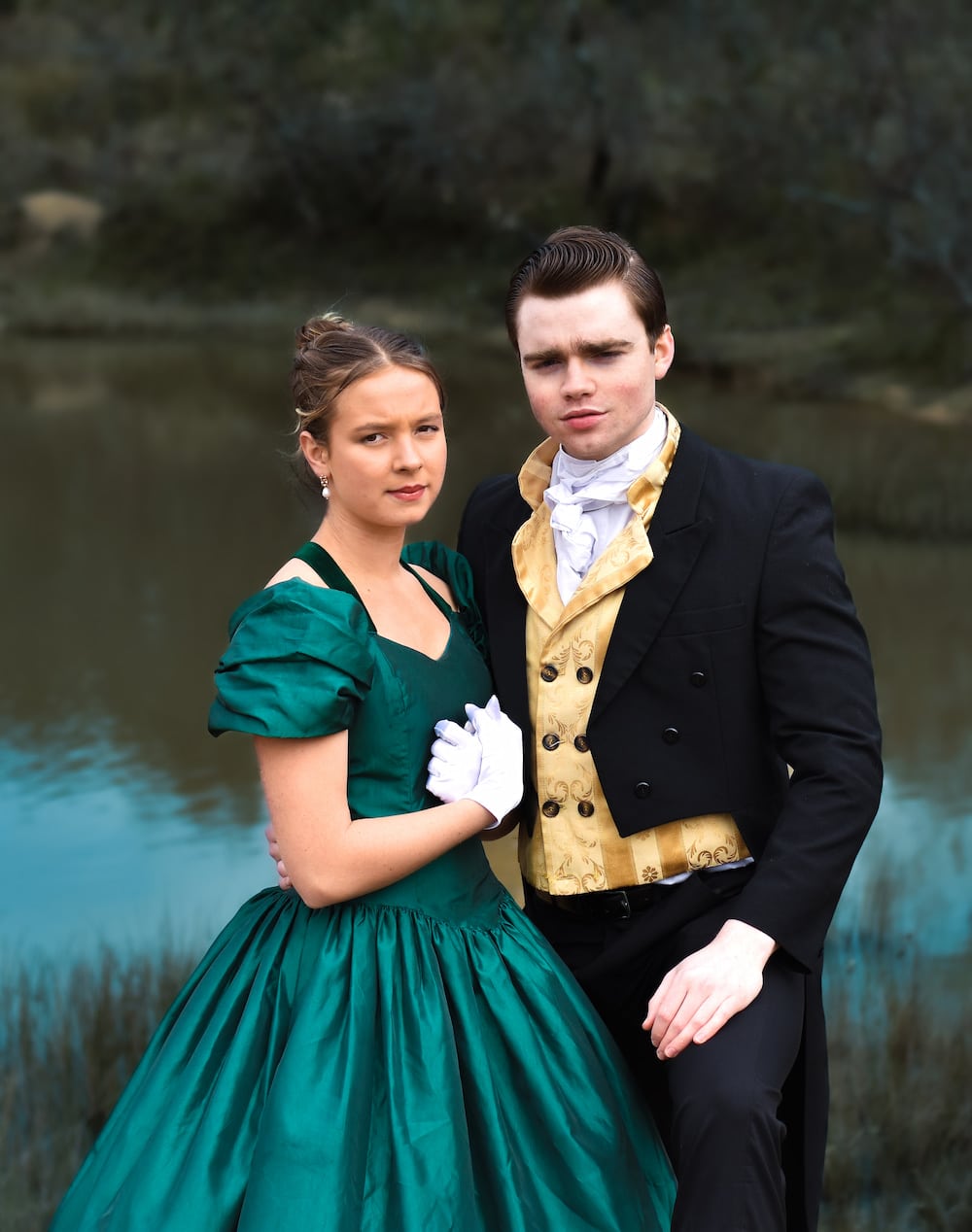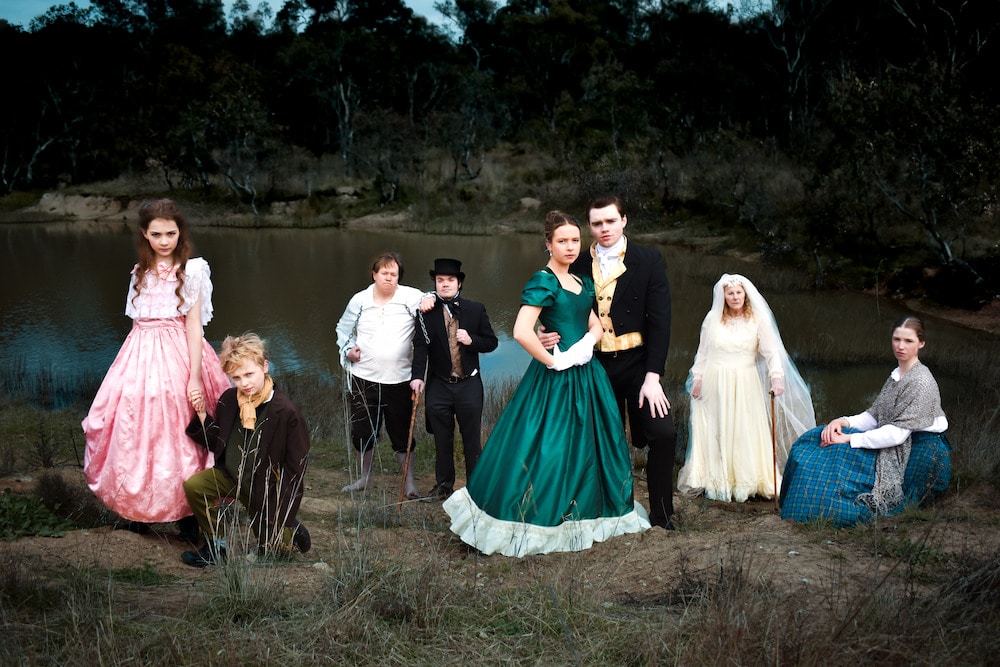Charles Dickens loved the theatre – as spectator, as playwright, and as brilliant amateur actor – and the performing arts have loved Dickens. This week, Canberra audiences can thrill to a rare adaptation of one of his best-loved novels, Great Expectations, by local playwright and producer Kirsty Budding, and brought to the stage by Budding Entertainment’s youth and adult casts.
“It’s a somewhat gothic love story with a strong element of social critique, and a cast of haunting, eccentric, and larger-than-life characters,” Budding says.
Here are gaunt, withered Miss Havisham, the abandoned bride in her veil, skeleton at her own decayed wedding feast. Here is the convict Magwitch, pursued by the hounds of the law, a frightening figure on the marshes, yet with a heart of gold under his rough exterior.
The unfortunate hero Pip appears in three aspects: the innocent, mistreated child whose act of kindness to Magwitch and encounter with Miss Havisham bear strange fruit; the self-conscious young man, who wants desperately to be a gentleman, who longs for the beautiful but chilly Estella, as out of his reach as a star, and who betrays the people who love him for a shallow existence; and a ghostly narrator looking back on the events of his strange life.
They are surrounded by a gallery of vivid, bustling, breathing characters: childhood friends and bullies, playboys and blacksmiths, snobs and greedy relations, lawyers and soldiers.
Dickens’s final completed novel, Great Expectations (1860) is one of his tightest, most closely plotted works. On one level, it is a sensation novel, full of betrayed women, mysterious fortunes, and family secrets; on another, it is a rags-to-riches story with a twist; and on a third, a study of obsessive love, ambition, the desire to better oneself, the mistakes of youth, corruption, and moral redemption.
“Dickens’s work is timeless,” director Rhys Hekimian says. “Dickens really taps into the humanity of trying to improve one’s outcome, to try to rise above one’s station, the search for true love – all those universal themes. It doesn’t matter whether it’s 1850, 1950, or 2022: self-improvement and finding someone that loves you for who you are, are things that everyone’s striving for, no matter who you are.”

Budding Entertainment’s past productions include Dickens’s Oliver Twist and Christmas Carol, Jane Austen’s Pride and Prejudice, F. Scott Fitzgerald’s Great Gatsby, and Louisa May Alcott’s Little Women – all with scripts Budding herself writes. Adapting classic literature is always a challenge, Budding says; Dickens’s novel is longer than 500 pages.
“Having said that, the structure and characters are there already; because I love 19th-century literature, I know my favourite lines, I know the beats I want to hit.”
One of those lines is her favourite romantic passage from English literature: Pip’s heartbroken speech when Estella dismissively tells Pip he will have forgotten her in a week. He explains how impossible it would be to forget Estella, as she is now a part of his life: “You have been in every line I have ever read and in every prospect I have ever seen.”
“Dickens creates imagery of various natural and manmade prospects with such a gorgeous, flowing rhythm that we feel how omnipresent Estella is in every moment of Pip’s life,” Budding says.
Non-naturalistic scenes – for example, the younger characters passing torches to their older selves to show time passing, or a ghostly picnic at the end – move the action forward in a theatrical and symbolic way. A narrator is Budding’s solution to the first-person voice of Dickens’s novel that reveals Pip’s inner world, his shame, his feelings for Estella, and the anxiety he feels about becoming another person for her. Although a low-budget production, there are also moments of spectacle, such as a grand ball scene.
Hekimian’s favourite scenes are “the conversations, the moments of realness, where a character is being open and honest about their feelings, or their prospects, or their life”: the blacksmith Jo telling Young Pip about his life and inability to be educated; the powerful presence of Miss Havisham; Pip and his friend Herbert Pocket, “silly boys dressed as men”; the romantic scenes between Pip and Estella.
“Dickens really taps into the humanity in all of us,” Hekimian says.
The youth and adult casts bring different energies to the productions, Hekimian believes; the shows are similar, but not carbon copies; each ensemble has developed its own blocking. The youth cast has a lightness and a bubbly energy that elevates their performance, he says, while the adult cast bring a grounded reality.
“They have lived and loved and experienced heartache and joys.”
Take the actresses playing Miss Havisham, “one of the most conniving, evil characters that Dickens has come up with”. Both performers steal the show when they are on stage, Hekimian says: “The cackle, the witchery, the cruelness is magnificent”. Eighteen-year-old Lily Welling, playing an older woman, is fluid: “She walks and moves through the stage as if she’s a ghost.” Joan White, in the adult cast, older and more experienced, “knows what it is to sit, to be still, to stay aligned with real pain”.
“What I love about this production,” Hekimian says, “is you do get a chance to explore the whole breadth of a person’s life.”
The two Young Pips – Reuben Reynolds (adult cast) and Zavier Johnson (youth cast) – bring frailty and innocence to the role, Hekimian says.

As the 20-year-old Pip, Bertram O’Brien (adult) and Tabby Silberman (youth) have the hardest job, Hekimian believes, playing a character on the verge of manhood and choosing the wrong things to value.
“When you’re playing a character who is in a state of transition of life, that’s when you’ve got to dig deep… Both have been serious and committed.”
Estella, the haughty object of Pip’s love, also appears as both child (Charis Bateman, adult; Rosie Welling, youth) and adult (Erin Blond, adult; Ary White, youth), who depict her journey from Miss Havisham’s indoctrinated ward, the instrument of her guardian’s revenge on men, to a suffering, loving woman. Assistant director Ruby Martyn also plays the adult Biddy, the kind but ‘common’ girl Pip might have otherwise found happiness with.

As Magwitch, Christopher McGrane’s performance (adult) is captivating, Hekimian says.
“He has brought the terrifying character to life, and made us fear his presence on stage. But he has also tapped into the innocence and kindness behind this vile character.”
But not a single actor phones in their performance, Hekimian says.
Supporting characters, who might only have a scene or two – like Anna Hemmings as Pip’s bad-tempered sister, or Shauna Priest as one of Miss Havisham’s greedy relations – give standout performances.
“Dickens gives you that. He makes strong characters.”
Budding Entertainment’s Great Expectations opens at the Belconnen Theatre on Saturday, 10 September, and runs until the following Saturday, 17 September. Tickets online.
“Come see a great show based on a great book, with some absolutely mesmerising performances by both Canberra youth and Canberra established actors,” Hekimian says.
And unlike Pip’s expectations, the audience’s will not be disappointed.
Nick Fuller plays the Narrator.



